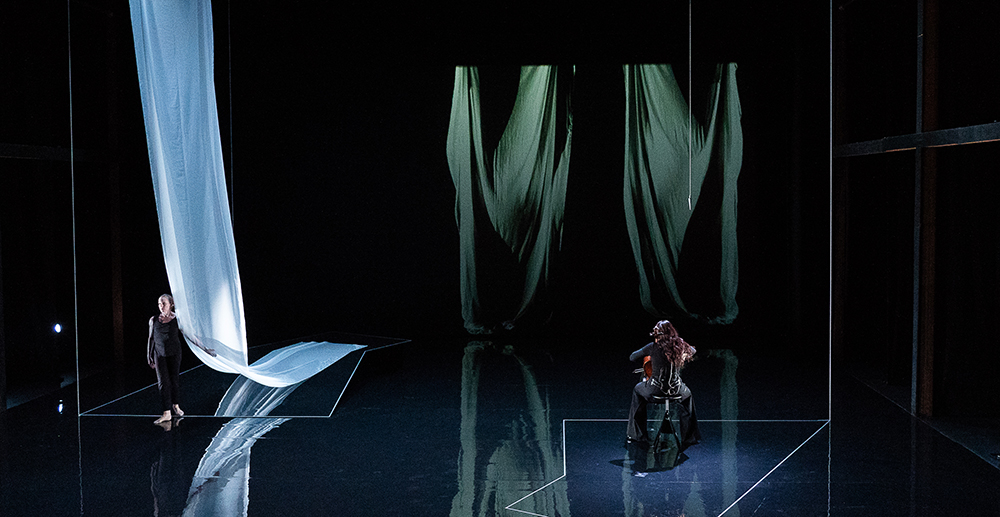Culture
 "The Day" // Photo: Hayim Heron, courtesy of Jacobs Pillow
"The Day" // Photo: Hayim Heron, courtesy of Jacobs Pillow
The Day Tackles Life, Death And All In Between At The Kennedy Center
December 7, 2019 @ 12:00am
The expiry of life is a shared experience. Yet, though our existence is riddled with these life-ending and life-altering moments, we tend to struggle with the acceptance or articulation of this obligatory unknowingly path-dependent terminus.
Fortunate for us, world-renowned cellist Maya Beiser has initiated a two-part collaborative effort, where audience members visiting the Kennedy Center December 6-7 will embark on a partially guided journey named The Day. Here, onlookers will grapple with their acceptance of life, death and everything in between, depending on your religious or ideological beliefs.
The conception of World to Come, the sequel of The Day, began forming during September 11, 2001, while American composer David Lang and Beiser were commissioned by Carnegie Hall to produce an evening performance.
The two were living in New York during the attack on the World Trade Center, and inspiration sprung from the unfathomable event, wherein the title of their work even emulates the acronym, WTC.
“The piece just became informed by that event,” Beiser says. “In particular, by this incomprehensible idea that there were thousands of people who woke up that morning, took the train or car and went to work, and a few hours later they were all gone weeks afterward. People in Union Square were just walking around sort of dazed with signs of their loved ones they were still looking for. People were looking for those who just kind of disappeared…that became the subject of this piece.”
The Day, was imagined after its sister title World To Come.
“We wanted to create this piece that is really about life; it’s really about the sanctity of memory,” Beiser says. “For this particular case, there were two compositions that were relating to death and September 11, something personal but also universal. I think super personal things are also the things that resonate with all of us on some level. We all, of course, have this predicament. We are all born and we are all going to die someday.”
The Day will feature three significant artistic expressions: Music, composed by Lang and performed by Beiser; dance, choreographed by Lucinda Childs; and performed by Wendy Whelan. Finally, there will be poetic texts crowdsourced online to reinforce the importance of memory.
“Three-hundred different people are answering the question, ‘If I remember the day?’ and it’s all these different memories from things that we think are super profound or super mundane, but they are all being told in this matter of fact and without any judgment [space]”, Beiser explains.
The text illuminated onstage is without a narrative, yet, naturally conveys, “what’s important and not important to us, and what it is that makes our lives and our human experience a community.”
Beiser will tell you firsthand that she is a visual musician, “You know, I’m a musician but I always see music, I don’t just hear it. Music has a very large sonic visual palette for me. When I play and when I perform, the visuals are always important to me.”
“As I was recording [The Day], I kept imagining a women dancer who danced with and who would communicate with me.”
In true Beiser fashion, she elicits the prowess of former New York City Ballet Company ballerina turned associate artistic director, Wendy Whelan, whom she came to admire since their meeting in 2010. “I thought she would be the absolute perfect person for this idea.”
Whelan joined the illustrious team without hesitation,.
“We just clicked personality-wise”, Whelan reminiscing over her early encounters with Beiser.
Whelan’s international dance career spans more than 30 years, so we wondered, how does her experience impact her movements concerning the illustration of life and death?
“It’s been interesting,” she says. “Since I left the New York City Ballet [as a principle dancer] five years ago, I’ve lost maybe five very very close friends. They’ve died very young, and I have to say, these experiences in dealing with this kind of lost have very much affected how I look at this work and what I bring to the work.”
“There’s sort of simplicity to [The Day]. I don’t overthink, I just dive into the work and almost relax into it. Because of my experiences and my age, I let go in life. I’ve let go of the ballet. I’ve let go of friends. The power in letting go is everything. We all want to control and we want to push through and hang on. The realization is that this sort of letting go of different chapters in our life or different people, it gets you to the next place. It helps us evolve and land with new wisdom. I’ve sort of learned the beauty and power in that, and I try to let that experience come through in my being.”
The Day is showing at The Kennedy Center, Eisenhower Theater, December 6-7 at 8 p.m. on both days. Tickets are $25-$69 and can be purchased online here.
The John F. Kennedy Performing Arts Center: 2700 F St. NW, DC; 202-467-4600; www.kennedy-center.org








